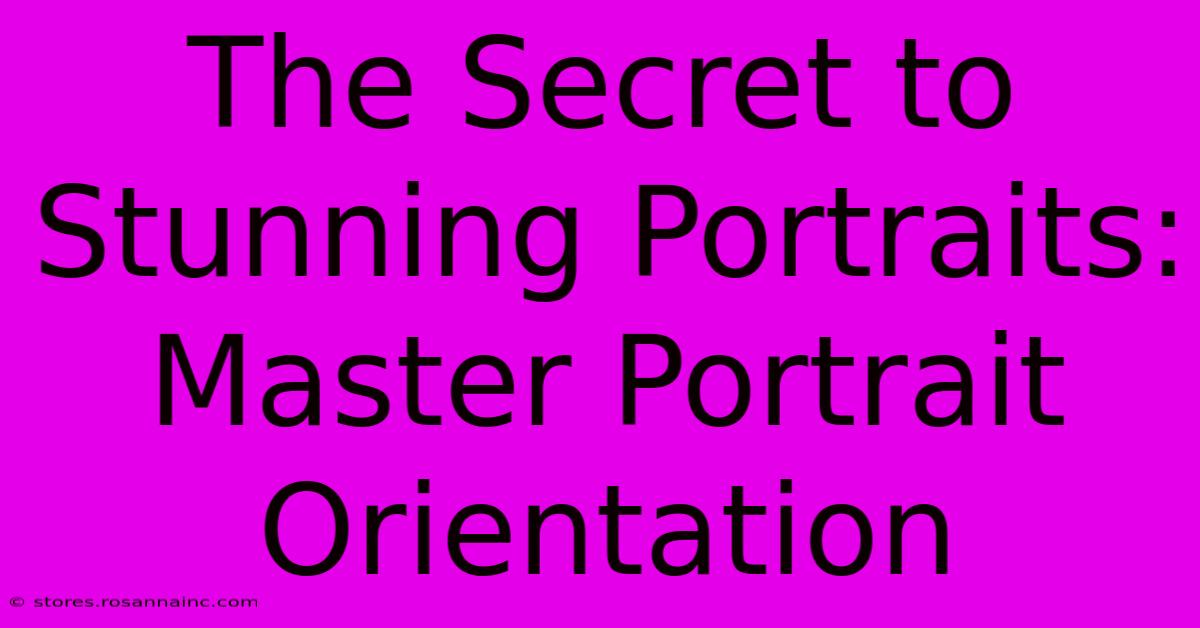The Secret To Stunning Portraits: Master Portrait Orientation

Table of Contents
The Secret to Stunning Portraits: Master Portrait Orientation
Choosing the right orientation – portrait (vertical) or landscape (horizontal) – is a crucial, often overlooked aspect of creating compelling portraits. It's more than just a technical detail; it dramatically impacts the mood, emphasis, and overall storytelling power of your image. This guide will unlock the secrets to mastering portrait orientation and elevate your portrait photography to the next level.
Understanding the Impact of Orientation
The orientation you select fundamentally alters the viewer's experience. Landscape orientation tends to feel broader, more expansive, and often emphasizes the environment surrounding your subject. Portrait orientation, conversely, draws the viewer's eye directly to the subject, creating a more intimate and focused feel.
Portrait Orientation: Intimacy and Focus
Why use it? Portrait orientation is ideal when you want to emphasize your subject's expression, details, and personality. It's perfect for:
- Headshots and close-ups: The vertical format naturally accentuates facial features and expressions.
- Emotional portraits: The intimate nature of the orientation enhances the emotional impact of the photograph.
- Showing height and stature: The vertical space allows you to fully capture the subject's height, creating a powerful visual statement.
- Creating a sense of elegance and sophistication: The vertical format often feels more classic and refined.
Landscape Orientation: Context and Environment
Why use it? Landscape orientation is best when you want to showcase the environment and context surrounding your subject. This works well for:
- Environmental portraits: Showcasing the subject within their natural surroundings.
- Capturing movement and action: The horizontal format can be ideal for dynamic shots where you want to convey a sense of movement.
- Creating a sense of breadth and scale: Landscape orientation lends itself well to emphasizing expansive backgrounds or settings.
- Telling a story: It allows you to include more context and elements that contribute to the overall narrative of the image.
Mastering the Choice: Tips and Tricks
Selecting the right orientation isn't arbitrary. Here's how to make informed decisions:
- Consider your subject: What are you trying to highlight? Their expression? Their environment? The answer will often dictate the best orientation.
- Think about the composition: Experiment with different orientations to see how the composition changes. Does the vertical format emphasize the subject's features effectively? Does the horizontal format create a balanced and pleasing composition?
- Rule of thirds (adapted): While the rule of thirds applies to both orientations, consider how the vertical and horizontal lines intersect and how they frame your subject.
- Negative space: Utilize negative space strategically. A lot of negative space in a portrait orientation can amplify feelings of loneliness or introspection. In landscape, it could enhance the sense of freedom or openness.
- Experimentation is key: Don't be afraid to shoot the same subject in both orientations. Compare the results and see which better captures your vision.
Beyond the Basics: Creative Applications
The choice of portrait or landscape orientation isn't just about technical correctness; it's a creative tool. Consider these advanced techniques:
- Breaking the rules: Sometimes, defying conventional wisdom can lead to striking and unexpected results. Experiment with unconventional compositions.
- Using orientation to create tension: A tightly framed portrait orientation can create a sense of claustrophobia, while a wide landscape shot could convey a sense of isolation.
- Combining orientations in a series: Showcasing a subject in both orientations within a larger portfolio or photo essay can tell a more comprehensive story.
Mastering portrait orientation isn't about adhering to strict rules, but about understanding the subtle yet powerful impact of this seemingly simple choice. By understanding the nuances of each orientation, you can unlock the potential of your portraits and create truly stunning imagery.

Thank you for visiting our website wich cover about The Secret To Stunning Portraits: Master Portrait Orientation. We hope the information provided has been useful to you. Feel free to contact us if you have any questions or need further assistance. See you next time and dont miss to bookmark.
Featured Posts
-
Cn 16 Vs C 41 The Ultimate Guide To Choosing The Right Film For Your Analog Adventure
Feb 06, 2025
-
The Power Of Worshiped Unlocking The Transformative Impact On Our Lives
Feb 06, 2025
-
Illuminating The Invisible The Art Of Capturing Emotion In Monochrome
Feb 06, 2025
-
Unlocking The Crazy The Team That Makes Weird Seem Tame
Feb 06, 2025
-
Break Free From Display Limitations Elevate Your Dual Monitor Experience With Hdmi Splitter
Feb 06, 2025
